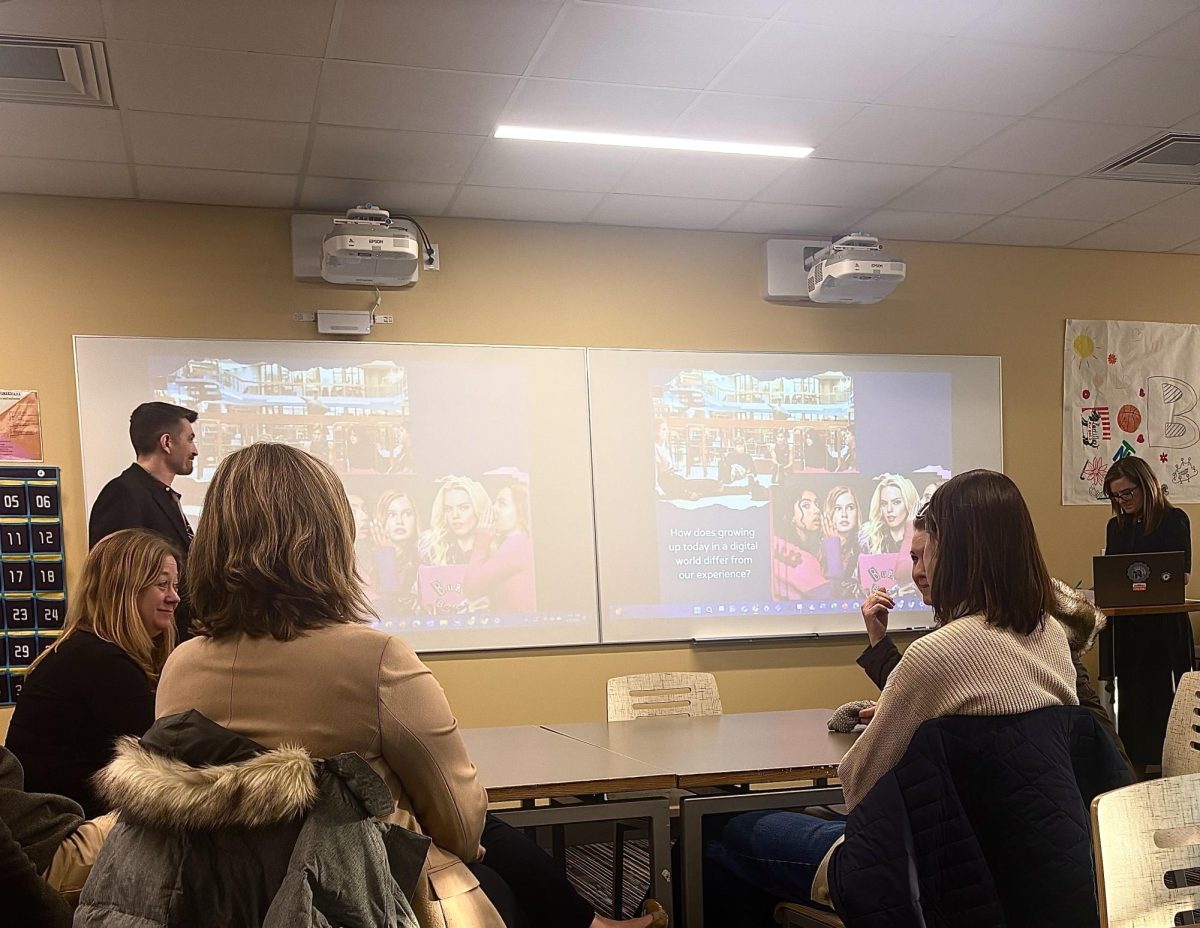In today’s constantly connected world, teenagers are growing up under public exposure that older generations never had to experience. To acknowledge the unique challenges this new reality creates, the New Trier Parents’ Association (NTPA) hosted an event on April 8 in the New Trier library to help parents better understand the digital environment their children are living in, and how to guide them through it.
The meeting focused on “Growing Up in Public: Coming of Age in a Digital World” by Devorah Heitner, a book that explores how social media and smartphones are revolutionizing adolescent development.
Leading the evening’s conversation were Winnetka Campus Principal and Assistant Superintendent Denise Dubravec and Associate Principal of Student Services Christopher Mitchell. They invited parents to have a thoughtful and honest discussion about what it’s like to raise teenagers in an era where privacy can often feel like a thing of the past.
Many parents attended the event seeking a deeper understanding of what it’s like to grow up surrounded by smartphones, social media, and constant access to a global network. They were encouraged to engage in small-group discussions and compare their own adolescence to their children’s experiences today.
“My son asked me, ‘Why are you going to this?’ and I told him, ‘I’m going to learn how you live with all this, and maybe be a better parent. I want to be an ally to my child,’” one parent said.
Throughout the room, parents reflected on the differences between generations.
“They get no quiet time because they fill it with their phones,” one parent said. Another added, “In our time, [our life] wasn’t documented, so we were freer to do what we wanted.”
Others noted the emotional toll of a constant online presence.
“I think it affects their confidence. They’re always checking in with friends about what they should post, but everything is online, so why wouldn’t they?” another parent said. It was also noted that “A lot of times things can be taken out of context, and they need to be mindful of that.”
During the event, Mitchell discussed the New Trier Tech Use Committee, a group tasked with rethinking the role of phones in classrooms as student phone use in class becomes a more prevalent issue.
“We decided to make a committee made up of teachers, administrators, and faculty and we really started to dig in and do research,“ Mitchell said. “We had to dig in and look at all the varying methods, and we had a few goals in mind, prioritizing instructional time being one of them.”
Beginning in the 2025–2026 school year, New Trier High School will implement a procedure requiring students to place their phones in “phone caddies” at the front of each classroom. Students will only be allowed to access their phones during breaks. This plan was already implemented at the Northfield Campus to test how well it would work, and next year it will debut in the Winnetka Campus as well. This aims to combat the urge many students may feel to check their phones during class, causing them to miss important material.
Dubravec hopes to guide students through this change by clearly explaining the new rules and the reasoning behind them.
“Kids need to know why we do what we do, so we’ll try to explain that to them next year,” Dubravec said, during the presentation.
She further explained that the implementation of the policy will take a “restorative approach” rather than a punitive one. Instead of handing out detentions for policy violations, administrators will aim to engage students in conversations about responsible technology use and the importance of setting boundaries.
As the evening wrapped up, one central idea was understood: teenagers should grow up feeling safe, respected, and free to make mistakes without fear of permanent digital consequences.
“Privacy is not a sign of secrecy, it’s a sign of respect and autonomy,” Dubravec said.






































